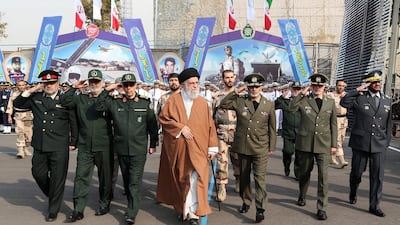The seven-member Terrorist Financing Targeting Centre in Riyadh on Wednesday designated 25 targets affiliated with Iran and Hezbollah, in the largest single designation to date.
The body, which brings together the UAE, Saudi Arabia, Bahrain, Kuwait, Oman, Qatar and the US, listed targets affiliated with “the Iranian regime’s terror-support networks in the region".
The entities sanctioned on Wednesday support Iran’s Islamic Revolutionary Guard Corps and Tehran’s regional proxy Hezbollah.
The commission said that several of the businesses targeted provided financial support to the Basij Resistance Force.
The force is “a paramilitary force subordinate to the IRGC that has long been used as shock troops by the regime to oppress domestic opposition with brutal displays of violence, while also recruiting, training and deploying fighters in IRGC-fuelled conflicts across the region".
“The TFTC’s co-ordinated disruption of the financial networks used by the Iranian regime to fund terrorism is a powerful demonstration of Gulf unity," US Treasury Secretary Steve Mnuchin said.
"This action demonstrates the unified position of the Gulf nations and the United States that Iran will not be allowed to escalate its malign activity in the region.
“We are proud to join forces with our TFTC partners to expose and condemn the Iranian regime’s gross and repeated violations of international norms, from attacking critical oil infrastructure in Saudi Arabia to fomenting strife in neighbouring countries through regional proxies such as Hezbollah.
“This co-ordinated action is a concrete step towards denying the Iranian regime the ability to undermine the stability of the region.”
US Secretary of State Mike Pompeo welcomed the taskforce’s move to reimpose measures on Iran for its “failure to uphold international anti-money laundering and countering the financing of terrorism standards".
“Iran deliberately ensures there is no transparency in its economy so it can continue to export terrorism,” Mr Pompeo said.
“The Islamic Revolutionary Guard Corps continues to engage in large-scale, illicit, financing schemes to fund its malign activities.”
He said the international community made it clear that Iran must live up to its commitments to behave “like a normal nation".
Twenty-one of the 25 entities fund the Basij, using a network of shell companies and other measures to mask their control of “multibillion-dollar business interests in Iran’s automotive, mining, metals and banking industries, many of which have significant international dealings across the Middle East and Europe.”
The entities were listed as specially designated global terrorists by the Office of Financial Asset Control on October 16, 2018.
The Terrorist Financing Targeting Centre was established in 2017 to bring together regional countries in an effort to stop the funding of militants and proxies.
The body was formed after a visit to Saudi Arabia by US President Donald Trump shortly after he took office.
Four of the designates were Hezbollah-affiliated people who lead and co-ordinate the group’s operational, intelligence and financial activities in Iraq, the US Treasury said.
The move “highlights the degree to which Hezbollah operates as a clandestine, terrorist arm of the Iranian regime by smuggling oil for Iran, raising funds for Hezbollah, and sending fighters to Syria for the IRGC-Quds Force on behalf of Qassem Soleimani.
Soleimani is the head of the IRGC's Quds Force, its foreign operations arm.
The men were Shibl Muhsin Ubayd Al Zaydi, Yusuf Hashim, Adnan Hussein Kawtharani and Muhammad Abd Al Hadi Farhat.
The office previously designated them as global terrorists on November 13, 2018.

